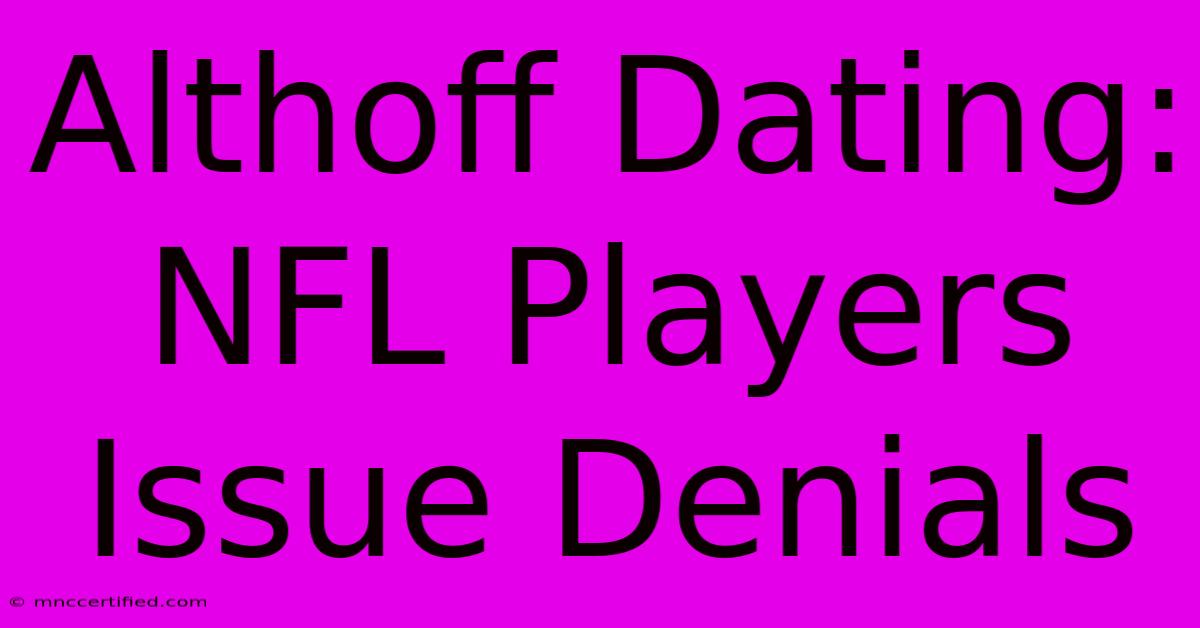Althoff Dating: NFL Players Issue Denials

Table of Contents
Althoff Dating: NFL Players Issue Denials – Separating Fact from Fiction
The internet, particularly social media, thrives on rumors, and the world of professional sports is no exception. Recently, the name "Althoff" has been circulating online, linked to various NFL players, sparking a whirlwind of speculation and denials. This article aims to dissect the situation, separating fact from the considerable fiction surrounding the Althoff dating rumors. We'll explore the origins of the rumors, analyze the players' responses, and discuss the importance of responsible reporting in the age of social media.
The Genesis of the Althoff Rumors: A Social Media Firestorm
The exact origins of the Althoff dating rumors remain unclear. However, it seems the initial spark likely originated on social media platforms like Twitter and Instagram, possibly through unverified accounts or anonymous tips. Once the rumor mill started churning, it quickly gained traction, amplified by gossip websites and blogs eager to capitalize on the sensational nature of the story. The lack of credible sources at the outset contributed to the rapid spread of misinformation. This highlights the danger of accepting online information at face value, especially when dealing with potentially damaging claims about individuals.
NFL Players Respond: A Chorus of Denials
In the face of mounting speculation, several NFL players named in connection with the Althoff dating rumors have issued public denials. These denials, often released through representatives or via social media, have generally been swift and emphatic. The players have consistently denied any romantic involvement with Althoff, emphasizing the fabricated nature of the rumors. These responses are crucial in attempting to counteract the damaging effects of false narratives. However, the sheer volume of online chatter makes it difficult to completely extinguish the firestorm.
Analyzing the Denials: Credibility and Context
It's important to assess the credibility of these denials within the context of the current media landscape. While the denials themselves may be truthful, the ease with which false information spreads online raises questions about the effectiveness of such statements. Simply denying the rumors, without providing further evidence or explanation, might not be enough to quell the persistent speculation. The reliance on social media for both the dissemination of rumors and the players' responses further complicates the issue, as social media platforms often lack robust fact-checking mechanisms.
The Importance of Responsible Reporting and Fact-Checking
The Althoff dating saga underscores the critical need for responsible reporting in the digital age. Journalists and media outlets have a responsibility to verify information before publishing, avoiding the amplification of unfounded rumors. Clickbait headlines and sensationalized reporting only exacerbate the problem. Instead, a focus on accurate and verified information is paramount. Consumers of news also bear responsibility, exercising critical thinking and verifying information from multiple credible sources before accepting it as fact.
Beyond the Headlines: Privacy Concerns and the Impact of False Accusations
Beyond the immediate drama, the Althoff dating rumors highlight broader concerns about privacy and the impact of false accusations in the digital age. The players involved are subjected to significant public scrutiny, and the false claims can damage their reputations, personal relationships, and even professional opportunities. It's crucial to recognize the human cost of online gossip and misinformation, reminding ourselves that behind every headline are real people with lives and reputations at stake.
Conclusion: Navigating the Digital Landscape
The Althoff dating rumors serve as a cautionary tale about the power and potential pitfalls of social media. The rapid spread of misinformation, the difficulty in controlling narratives, and the impact on individuals involved all underscore the need for greater media literacy, responsible reporting, and critical thinking in the digital age. While the truth behind the rumors may remain elusive to some, the players' denials and the subsequent analysis highlight the importance of verified information and the ethical responsibility of all those involved in disseminating news and information.

Thank you for visiting our website wich cover about Althoff Dating: NFL Players Issue Denials. We hope the information provided has been useful to you. Feel free to contact us if you have any questions or need further assistance. See you next time and dont miss to bookmark.
Featured Posts
-
New Masters Programs At Rockford U
Dec 19, 2024
-
600 M Adidas Deal For Lillard
Dec 19, 2024
-
Fed Cuts Rates Again Main Points
Dec 19, 2024
-
Trumps Bahamas Ambassador Herschel Walker
Dec 19, 2024
-
Sergio Perez Red Bulls Latest Decision
Dec 19, 2024